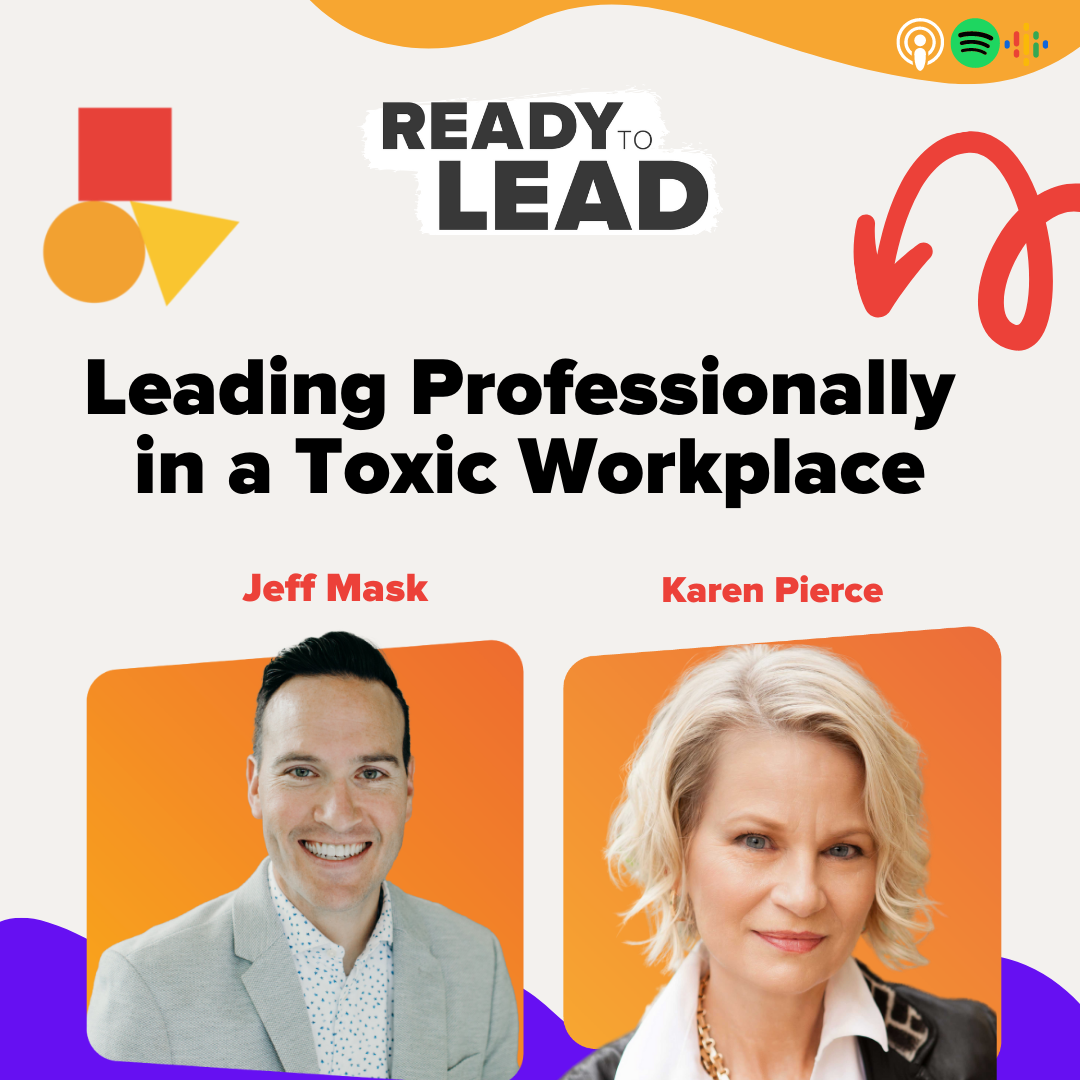Leading Professionally in a Toxic Workplace with Karen Pierce
It can be hard to know how to navigate a really tough environment as a leader. This is how one woman did it really well.
On today’s episode, host Jeff Mask sits down with Karen Pierce, CEO of KMP Consultants, to talk about best practices in leadership and how to deal with tough, even toxic, work environments. Karen and Jeff met at an event where Karen told him, “we speak a very similar language.” It’s true. They do. The bottom line? They both believe deeply that leadership is all about putting people first. It’s not as much about skills and getting things done. It’s about developing people, inspiring them, motivating them.
Karen heard someone say once: “You can’t be a leader if nobody’s following you. And if nobody’s following you, you’re just out on a nice walk.”
Listen in for some great examples of leading well when things aren’t going so great.
What Karen Does Now and How She Got Here
Karen helps leaders in organizations navigate change by developing an environment where people can thrive and have fun, feel valued, like they have a place, like they’re a part of the organization, not just someone who gets assigned a task.
Work doesn’t have to be a four-letter word, she says. It should be rewarding and affirming. We spend at least a third of our waking hours there. Rather than endure it to the weekend, we should feel like we’re contributing to something better than ourselves. As we look at this Great Resignation, employees are voting with their feet. If we don’t create an environment where they can thrive, they’re heading somewhere else.
Karen’s journey started when she was a young female aerospace engineer who faced a significant amount of resistance in spite of her ability. Women just weren’t respected in the field, in general, and being good at what she did turned out to be more negative than positive. She could work really hard and do a great job and still not be part of the team.
People felt threatened by her. Her work was sabotaged. When she got promotions, people talked about who she slept with to get there. Her life was even threatened. She came to a decision point. Pursue this or quit and find something else. “I have a purpose here,” she decided. “I can try to make a difference.” Maybe she could change people’s minds and make things better for the women who came after her.
Dealing with Toxic Work Environments
Over the course of her career, Karen has handled toxic work environments with grace. At one point, Karen’s boss sent a problem employee to her. This employee was frustrated with his job, was feeling very threatened, and had almost hit his manager. He was dealing with mental health issues that people didn’t know about at the time, putting Karen in a difficult situation. He threatened her life at one point, but no one believed her. It wasn’t until they were in court (he sued her) and had an outburst, that her lawyer realized her life was in danger.
Leading through mental health challenges is so tough, and is part of a leader’s reality more now than it’s ever been. Passing employees from one leader to the next isn’t the best idea. Help them be extraordinary first in their current role, before passing them on. If it’s happened more than twice, don’t be seduced as a leader, thinking you can be a hero. There’s a pattern there.
Not being believed is a frustrating, even terrifying, thing. It took a lot of guts for Karen to raise red flags, because she was young and female. She didn’t want to be a failure. She asked good questions and kept good records, and eventually the truth came to light.
Fast forward in her career to when she got a leadership position that several people she was leading wanted. They were in an open office environment with about 40 people. The VP came barreling in, hair on fire, screaming obscenities, and heading toward her desk. Apparently, she had written something in her weekly report that had made its way to the President’s desk, and this guy had gotten flak for it and decided to humiliate her.
She calmly stood up and said, “I think this conversation would work better in the conference room.” She went and he followed, and it just got worse. She finally said, “I think we’re both upset and should take a breather and reconvene when we’re calm.” Everyone saw her walk out and walk back to her desk where she had a private meltdown.
What Karen Did Right
Karen noticed immediately after that encounter that her esteem at the company rose incredibly. She had shown that she respected herself, sending a message to her team that she would have their backs and respect them as well. She could have cowered in the man’s presence, f-bombed right back at him, even assaulted him. But she responded with grace and dignity, clarity and confidence.
She had the discernment to know to take it somewhere private, then the discernment to stop it so he could calm down. People gravitated to her to be led by her because of how she led herself in that moment. Her boss recognized that he could rely on her to be professional when things were uncomfortable, and her peers stepped up their game. She elevated the game for everyone.
Ask yourself these questions about Karen’s situation:
- Where does this apply to me as a leader?
- How has it applied to me in the past?
- How might it apply to me in the future?
- How will I choose to respond if this happens to me?
In the end, good wins over bad, Karen says. It’s up to you to maintain your own principles. Jeff likes to call these character-revealing moments. Our character is developed in the private moments when no one is watching. In business, we have all sorts of moments where things don’t go the way we want. Whatever the stress is, those are character-revealing moments.
Choose to respond positively, powerfully, and productively. It’s our choice. It’s a lot easier to lead when things are great. In leadership, we show our face when tough times arise.
Leadership is about others, Karen says. It’s about the people you lead. Take the ego out of it. Don’t take things personally. Think about how you can help others get through it.
Richard and Jeff want to hear from YOU. Was something in today’s episode a big aha moment for you? Anything you disagreed with? What did you learn that you’ve applied to your leadership? Email them here with your thoughts/questions: feedback@readytolead.com
RESOURCES:
OTHER SHOWS YOU MIGHT ENJOY:
- Business Lunch with Roland Frasier and Ryan Deiss
- Perpetual Traffic with Ralph Burns and Kasim Aslam
- DigitalMarketer Podcast with Mark de Grasse


